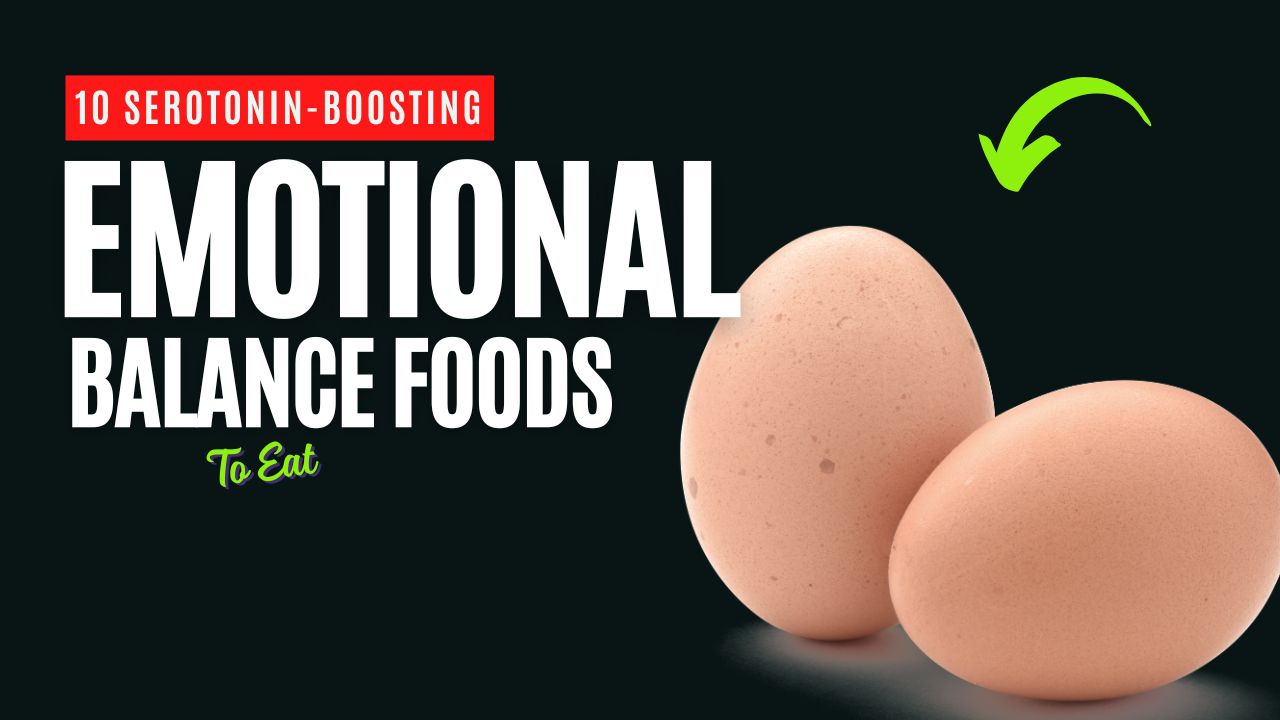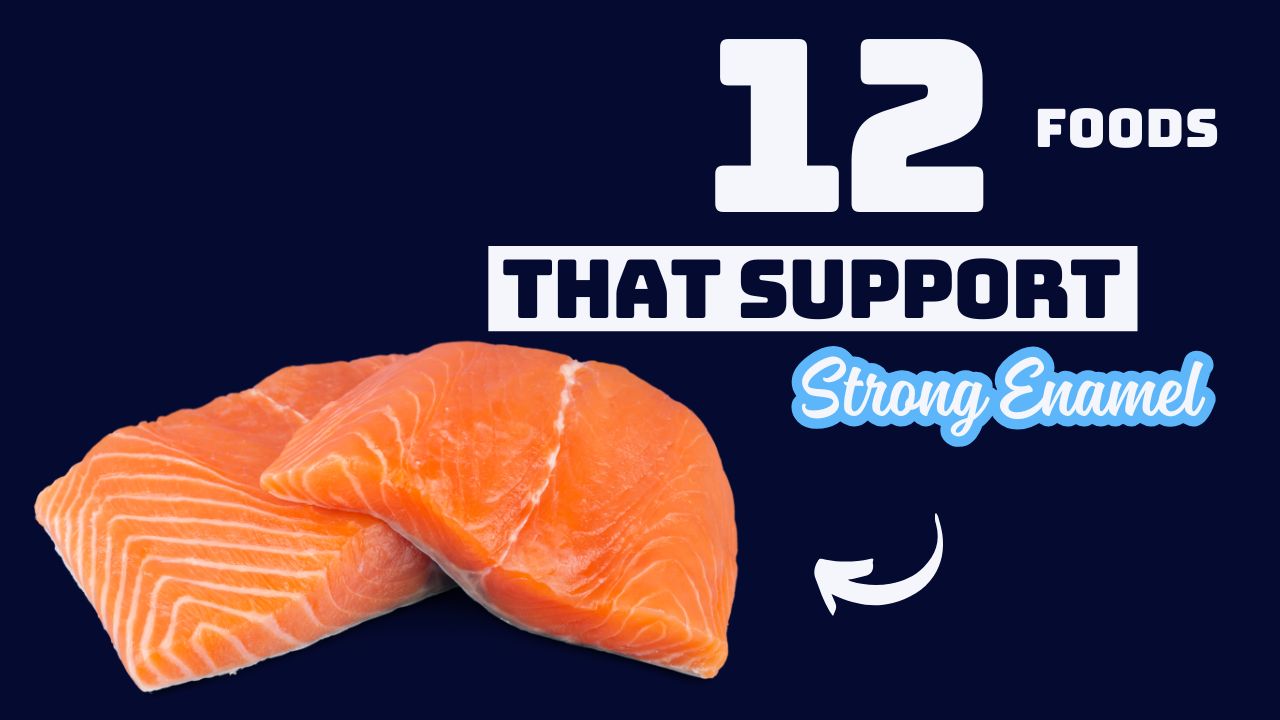Do you know your quadriceps are one of the largest muscle groups in your body—and play a key role in almost every lower-body move, from walking to jumping? Yet they’re often overshadowed by glutes or hamstrings in training.
Well, it’s time to fix that. Whether you’re chasing strength, muscle definition, or improved athletic performance, this list of 13 dumbbell quad exercises will fire up your thighs like never before. No fancy gym machines, just solid moves and dumbbells! Let’s dive in:
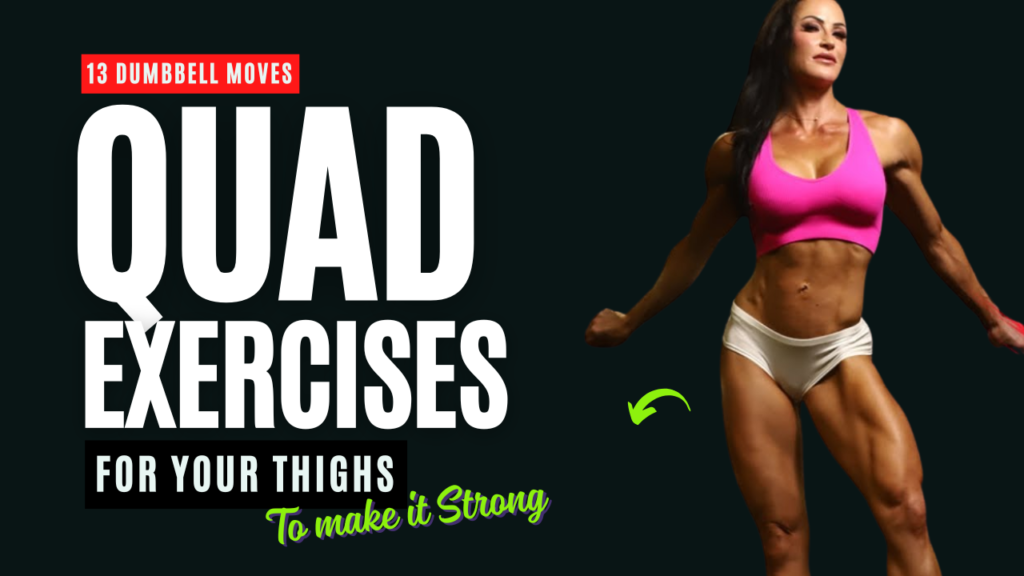
Table of Contents
After 30 Days of Dumbbell Quad Training – What to Expect
| Benefits You May Notice | What It Means for You |
|---|---|
| Increased quad strength | Easier squats, lunges, and daily movements like climbing stairs |
| Visible muscle tone in thighs | Legs look more defined and sculpted |
| Improved balance and coordination | Better posture, athletic performance, and injury prevention |
| Enhanced endurance | You can do more reps without getting tired |
| Stronger knees and joint support | Reduced risk of knee pain or injury during activity |
| Boosted metabolism | More lean muscle = more calories burned at rest |
| Greater mind-muscle connection | Better control and focus during every workout |
| Confidence in leg workouts | You’ll be more comfortable trying advanced moves |
| Better workout discipline | Regular training can build consistency in your routine |
| Motivation to keep going | Visible and physical results encourage long-term fitness commitment |
Also Read: 15 Gym-Based Lower Back Exercises to Build Strength & Prevent Injury
Do’s and Don’ts of Dumbbell Quad Exercises
| Do’s | Don’ts |
|---|---|
| Warm up your legs before starting (5–10 min dynamic warm-up) | Don’t skip warm-up—it increases injury risk |
| Start with lighter weights to learn proper form | Don’t lift heavy if your form is breaking down |
| Maintain an upright chest and engage your core | Don’t round your back or lean forward too much |
| Control both the lowering (eccentric) and lifting (concentric) phases | Don’t rush the movement or use momentum |
| Use a full range of motion (90° knee bend or deeper) | Don’t do partial reps unless you’re targeting a specific range |
| Rest 24–48 hours between quad sessions for recovery | Don’t train the same muscle every day—it limits growth |
| Focus on balance in unilateral exercises like lunges | Don’t ignore one side if it’s weaker—train both evenly |
| Breathe: inhale on the way down, exhale on the way up | Don’t hold your breath (can spike blood pressure) |
| Track your progress with reps, sets, and weights | Don’t wing it—no tracking means no real progress |
| Include variety: squats, lunges, isometrics, etc. | Don’t repeat the same 2–3 exercises every workout |
1. Dumbbell Front Squat
Targets: Quads, core
How to Do It:
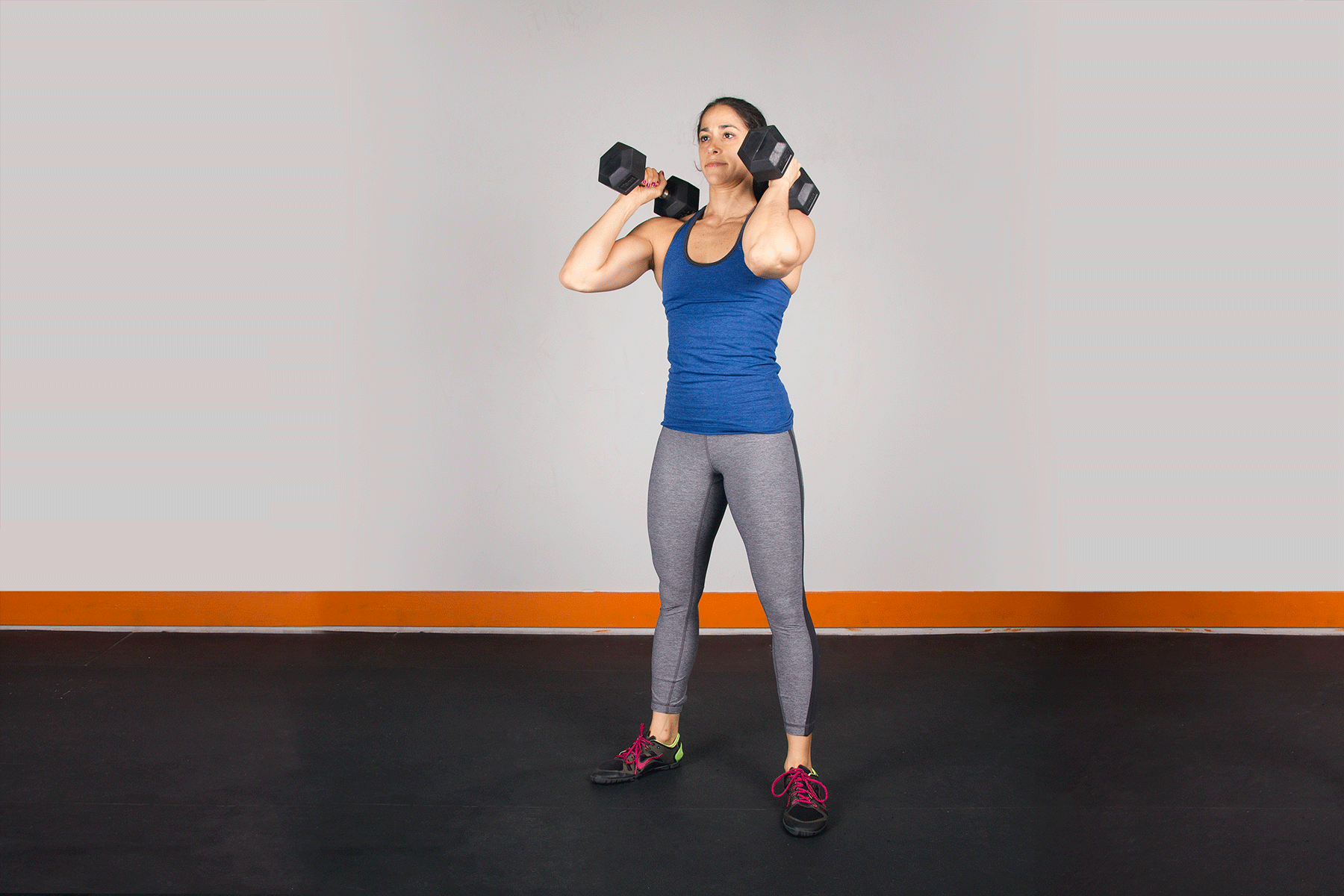
- Hold a dumbbell in each hand at shoulder level.
- Stand with feet shoulder-width apart.
- Lower down into a squat, keeping your elbows high and chest upright.
- Push through your heels to stand back up.
Fact: Front-loaded squats place more tension on the quads than back-loaded ones.
2. Dumbbell Bulgarian Split Squat
Targets: Quads, glutes, balance
How to Do It:
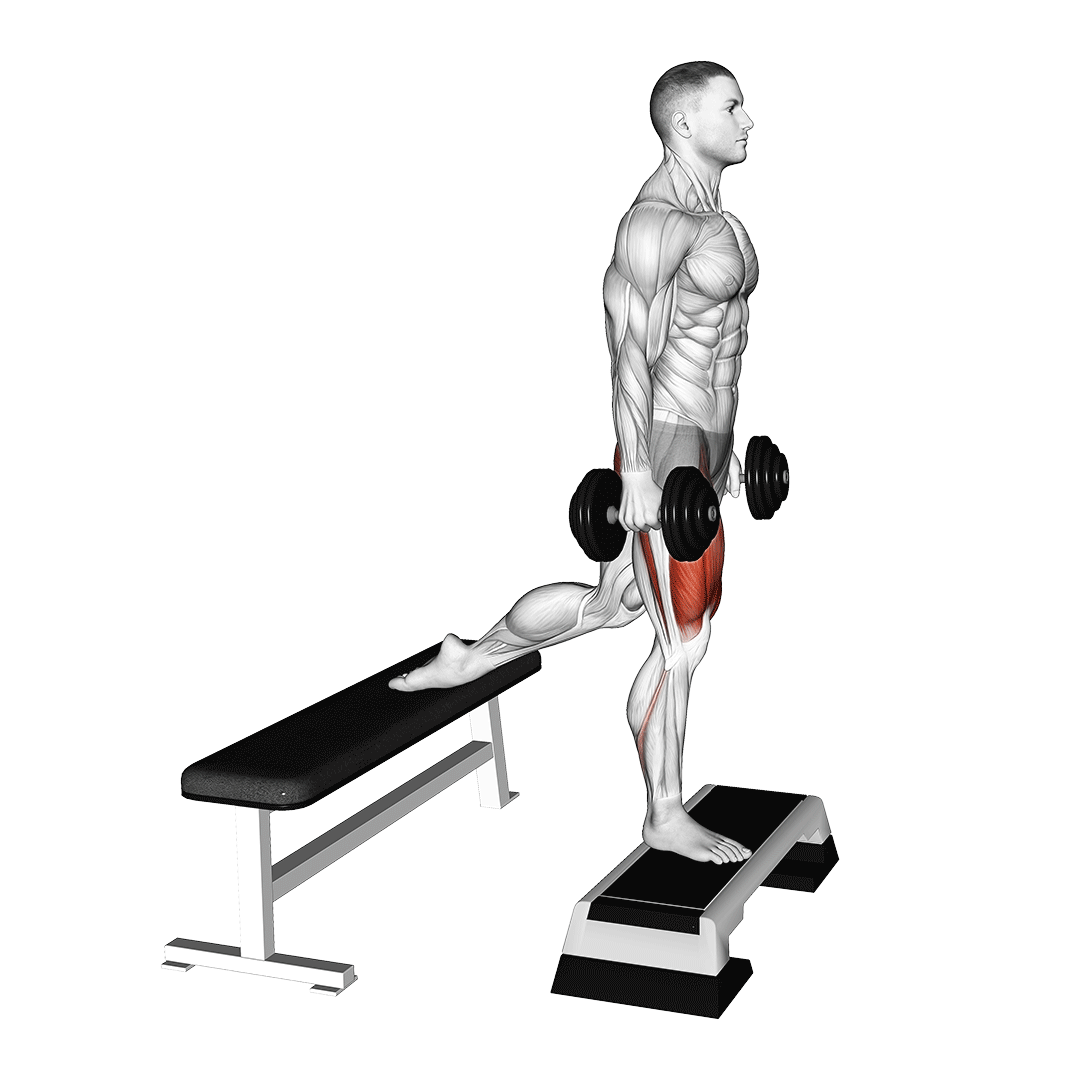
- Place one foot behind you on a bench.
- Hold dumbbells at your sides.
- Lower your back knee toward the floor while keeping the front knee over your ankle.
- Drive through your front foot to rise.
Myth Buster: People think this is just for glutes—but it’s a quad killer, especially if you take a shorter step forward.
Also Read: 12 At-Home Lower Back Exercises Using Just Bodyweight
3. Dumbbell Goblet Squat
Targets: Quads, core
How to Do It:
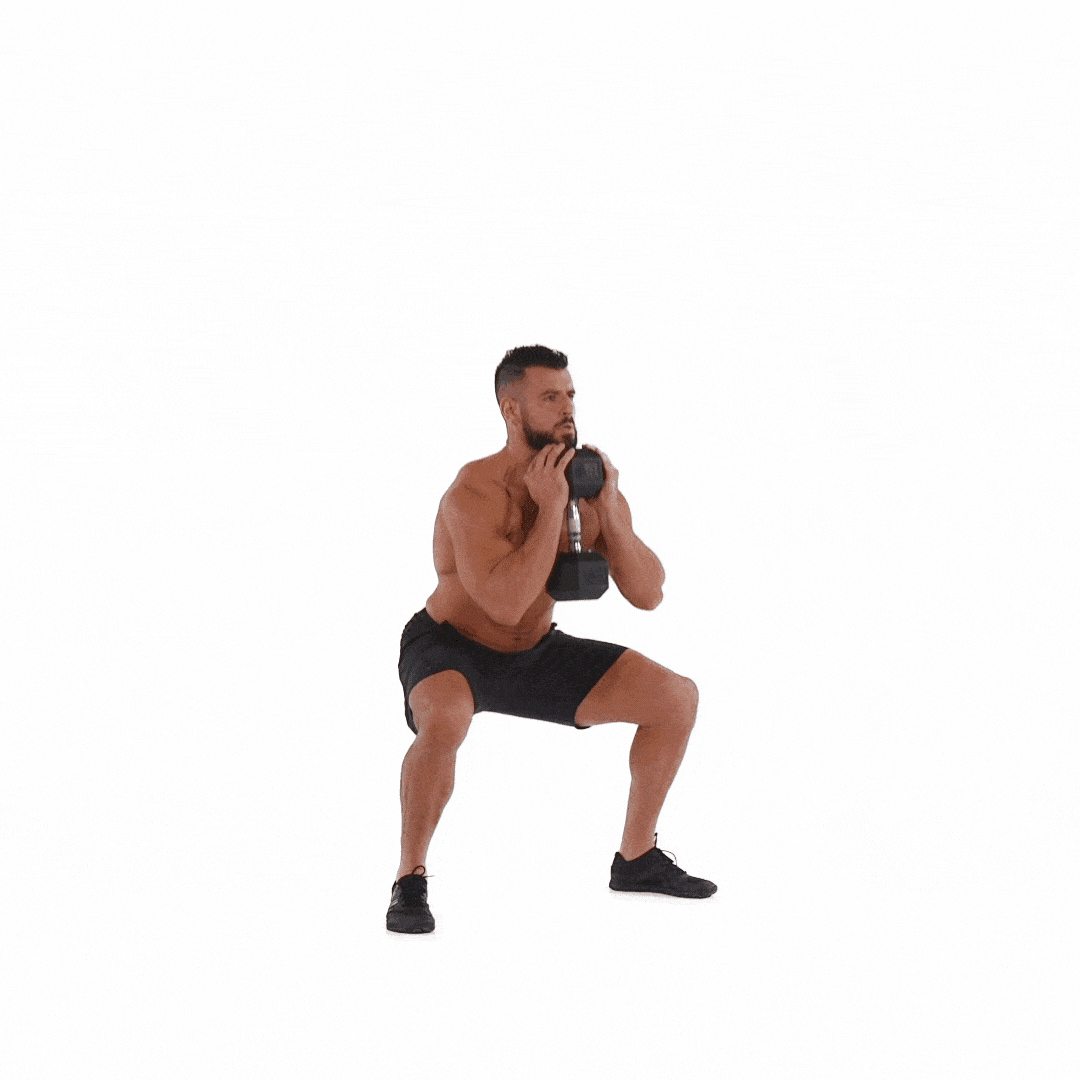
- Hold a dumbbell vertically at your chest.
- Lower into a squat, keeping the weight close to your body.
- Rise up by pressing through your heels.
Bonus: This move teaches great squat mechanics and helps improve mobility.
4. Dumbbell Step-Up
Targets: Quads, glutes
How to Do It:
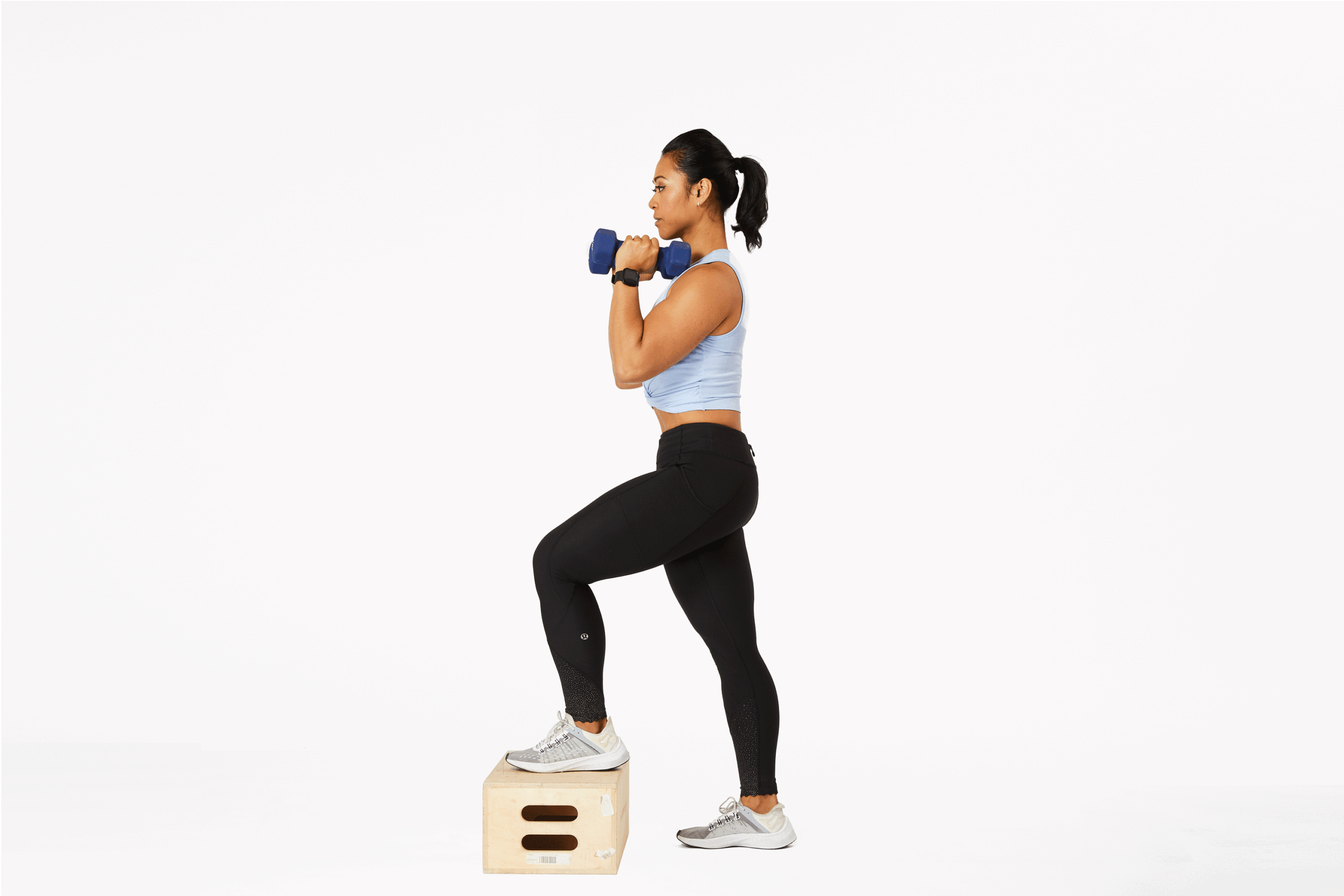
- Stand facing a sturdy bench or box.
- Hold dumbbells at your sides.
- Step up with one foot, driving through your heel to lift your body.
- Lower back down and repeat on the same leg or alternate.
Did You Know? Step-ups activate the vastus medialis (teardrop muscle) more than many other leg exercises.
5. Dumbbell Sissy Squat
Targets: Isolated quad emphasis
How to Do It:
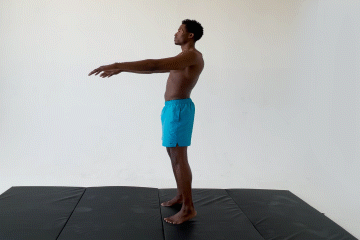
- Hold light dumbbells for balance.
- Rise onto your toes and lean your upper body backward.
- Bend your knees to lower your body while keeping your torso straight.
- Return to starting position.
Caution: Keep reps controlled and limit range if you’re new—this is intense on the knees.
Also Read: 13 Equipment-Based Calf Exercises to Power Up Your Lower Legs
6. Dumbbell Walking Lunge
Targets: Quads, glutes, balance
How to Do It:

- Hold dumbbells at your sides.
- Step forward and lower into a lunge.
- Push through your front foot and step the other leg forward into the next rep.
Trainer Tip: Shorter steps emphasize quads; longer ones hit glutes more.
7. Dumbbell Wall Sit
Targets: Quads (isometric strength)
How to Do It:
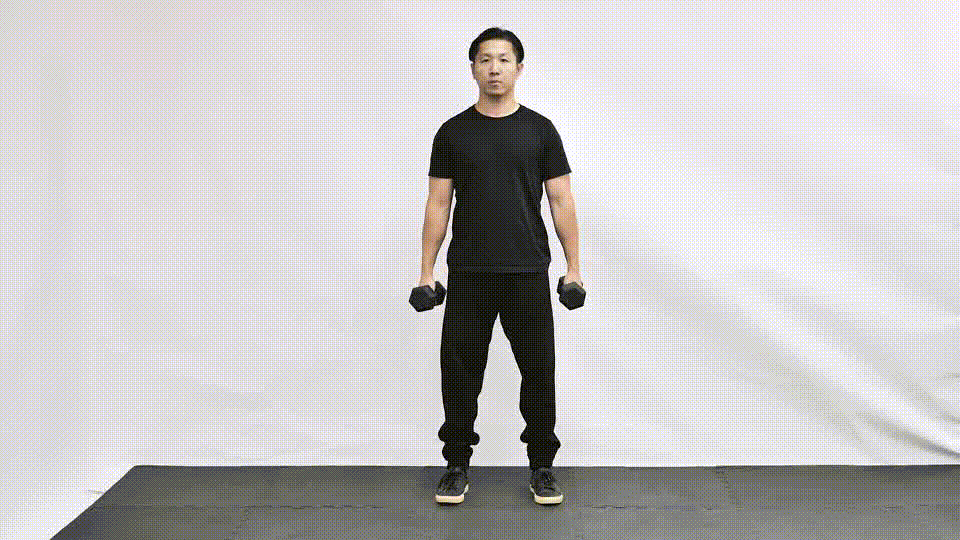
- Lean your back against a wall.
- Hold dumbbells at your sides or rest them on your thighs.
- Slide down until your knees are at a 90° angle.
- Hold the position for 30–60 seconds.
Add Intensity: Lift your heels off the ground during the hold to torch your quads even more.
8. Dumbbell Cyclist Squat
Targets: Outer quads
How to Do It:
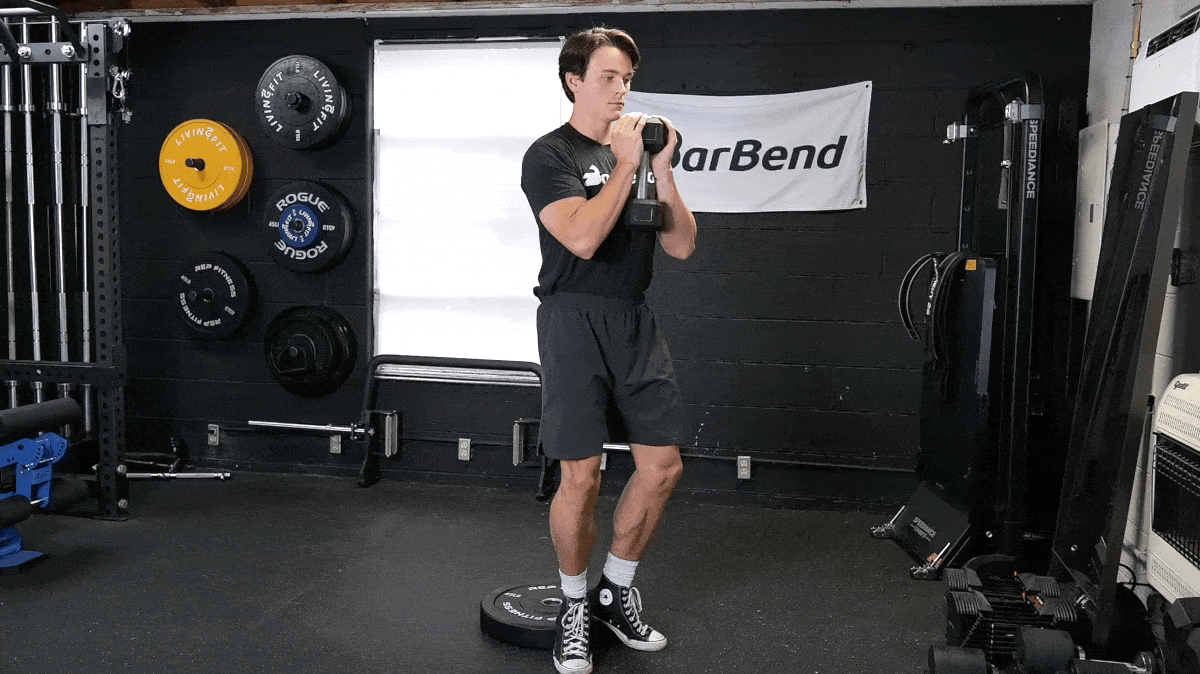
- Elevate your heels slightly using a plate or wedge.
- Hold a dumbbell goblet-style.
- Squat down with a narrow stance.
- Rise back up while keeping the heels raised.
Why It Works: Mimics the deep knee bend of cycling—smashing the vastus lateralis (outer quad).
Also Read: 15 Bodyweight Calf Exercises to Sculpt Stronger, Leaner Legs
9. Dumbbell Lateral Lunge
Targets: Quads, inner thighs, glutes
How to Do It:
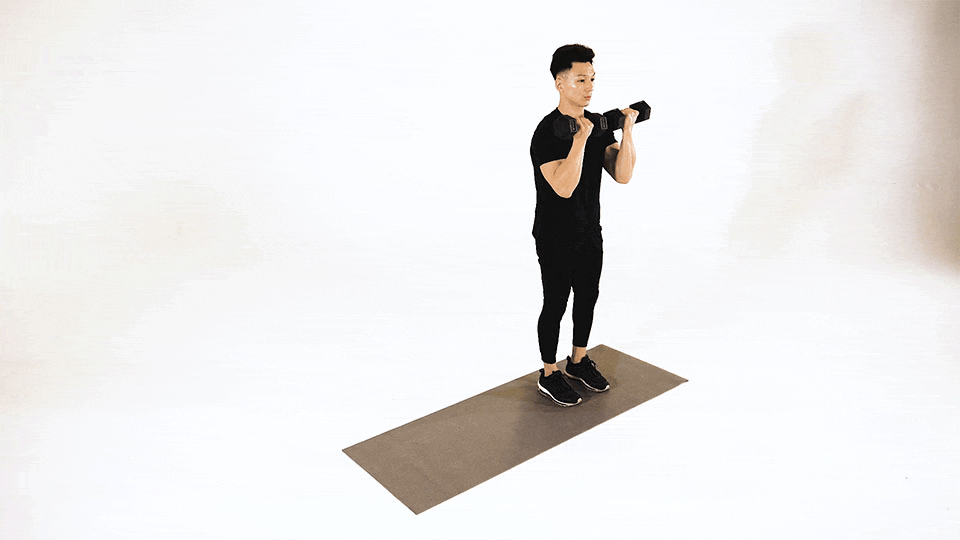
- Hold dumbbells at your sides.
- Step to the side, pushing hips back while keeping one leg straight.
- Push off and return to start.
Fun Fact: Lateral lunges train in a different plane of motion—often neglected but essential.
10. Dumbbell Heel-Elevated Squat
Targets: Emphasizes quads over hips
How to Do It:
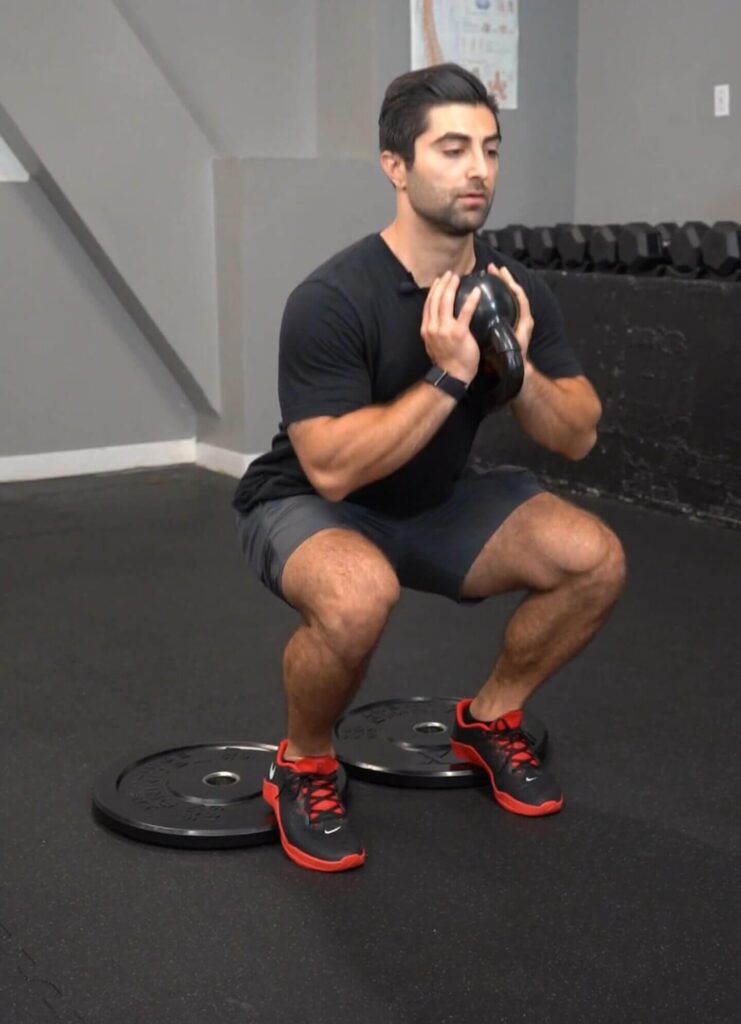
- Elevate heels on a small plate or platform.
- Hold dumbbells at your sides or goblet-style.
- Perform a squat while keeping your chest upright.
Why Elevate? Shifts weight forward and increases knee flexion = more quad focus.
11. Dumbbell Jump Squat
Targets: Power, explosive quads
How to Do It:
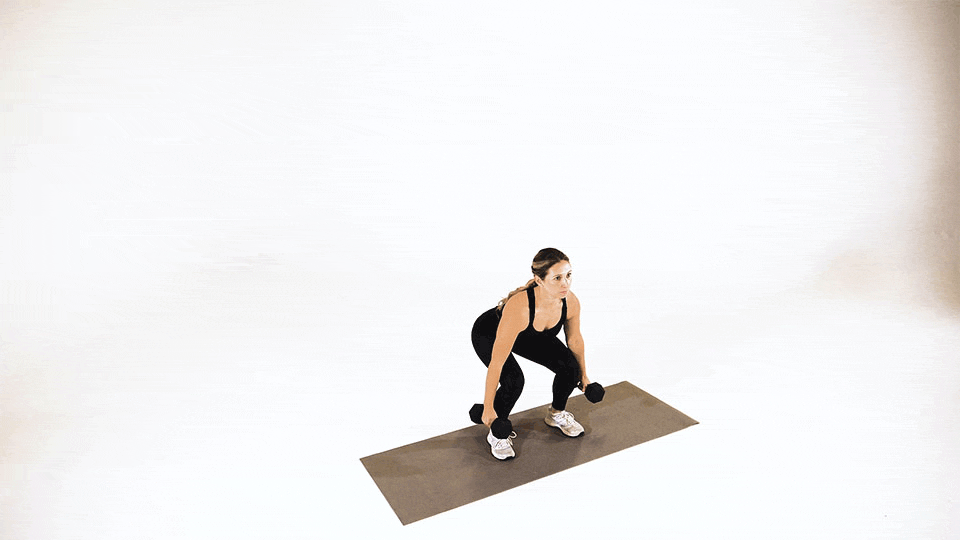
- Hold light dumbbells at your sides.
- Lower into a squat and jump up explosively.
- Land softly and repeat.
Note: Keep reps low and focus on control to prevent joint stress.
Also Read: 11 Abductor Exercises Using Equipment That Boosts Hip Strength
12. Dumbbell Single-Leg Squat to Box
Targets: Quads, stability
How to Do It:
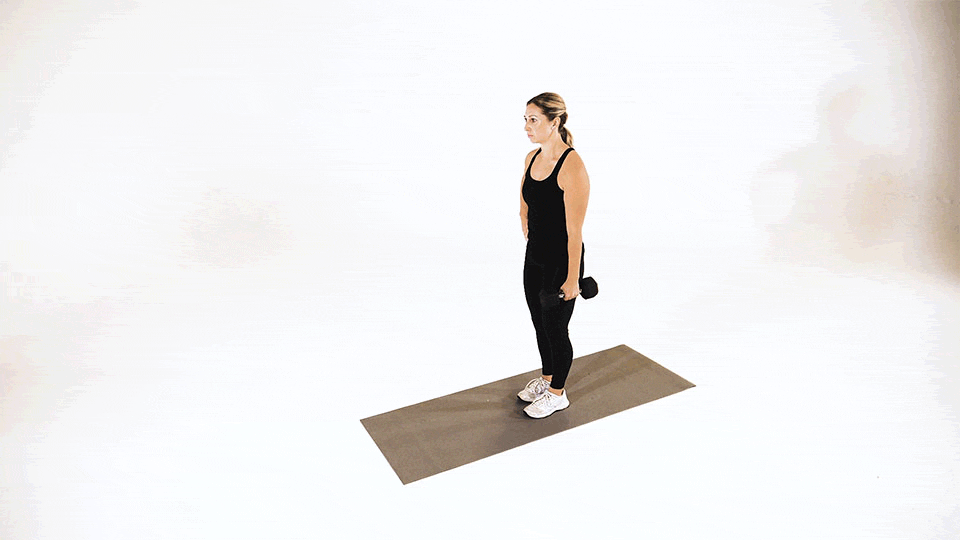
- Stand in front of a box or bench.
- Hold a dumbbell in each hand.
- Lower yourself on one leg to sit on the box, then stand back up without using your hands.
Builds Bulletproof Quads: Single-leg training corrects strength imbalances.
13. Dumbbell Terminal Knee Extension (TKE)
Targets: Vastus medialis (VMO)
How to Do It:
- Anchor a resistance band at knee height and loop around the back of one knee.
- Hold dumbbells in hand or rest at the side.
- Slightly bend the knee, then straighten it against band resistance.
Secret Weapon: Excellent for rehab or quad activation before workouts.
Wrap-Up: Strong Quads, Strong You
Don’t let your quad training take a back seat. Strong quads improve your squat strength, jump height, and even your knee health.
These dumbbell exercises not only add variety but also allow targeted progression from beginner to beast mode. Mix and match 3–5 of these moves into your leg day, and you’ll be on the path to powerful, sculpted thighs.
No machines. No excuses. Just dumbbells—and relentless quads.
Also Read: 13 Bodyweight Abductor Exercises for Stronger, Sculpted Hips
Frequently Asked Questions (FAQs)
Can I build big quads with just dumbbells?
Yes. With consistent training, progressive overload, and proper form, dumbbells can be highly effective for building quad size and strength. You don’t need fancy gym machines—just dedication and the right exercises.
How many times a week should I train quads?
Training quads 2–3 times a week is ideal for strength and growth, provided you’re allowing at least 48 hours of rest between intense sessions to allow muscle recovery.
What’s the best dumbbell weight for quad exercises?
Start with a moderate weight that challenges you for 10–12 reps with good form. Gradually increase as you get stronger. It’s better to start light and progress than to risk injury with heavy weights early on.
Are dumbbell quad exercises good for beginners?
Absolutely. Many of the listed exercises like goblet squats, step-ups, and wall sits are beginner-friendly. Focus on form first, then gradually increase intensity.
Can dumbbell quad exercises help with knee pain?
Yes—if done correctly. Strengthening the quads supports knee stability. Exercises like wall sits, step-ups, and terminal knee extensions (TKEs) are especially helpful. However, consult a professional if you’re experiencing chronic pain.
Should I do quad exercises before or after cardio?
If your goal is to build strength and muscle, do quad exercises before cardio. That way, your legs are fresh, and you can lift with maximum intensity.
How long does it take to see results from quad training?
Visible results can be seen in 4–8 weeks, depending on your training consistency, diet, recovery, and genetics. Strength gains may be noticeable even sooner.
Do I need to train hamstrings and glutes too?
Yes. A balanced leg routine should target quads, hamstrings, and glutes to improve overall performance, reduce injury risk, and create symmetry.
What’s the difference between front squats and goblet squats?
Both emphasize the quads, but front squats (with two dumbbells at shoulder height) allow heavier loads and more quad isolation, while goblet squats (with one dumbbell held at the chest) are easier to learn and improve posture.
Can I combine these quad exercises in one workout?
Yes. Choose 4–5 exercises, perform 3–4 sets of 10–15 reps each, and you’ve got a killer quad-focused dumbbell workout.
